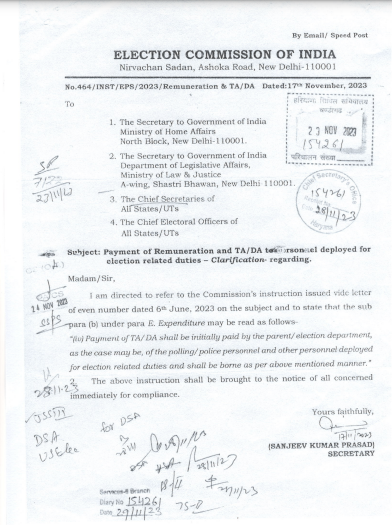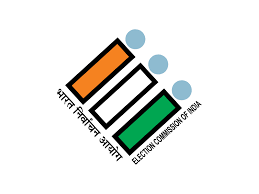
Election Duty
Payment of Allowance (TA DA) During Election Duty
Election duty is a critical responsibility that requires extensive travel and time commitment from government officials. To ensure these officials are adequately compensated, the government provides TA DA (Travel Allowance and Daily Allowance). These allowances are crucial for covering expenses incurred during election duty, fostering efficiency and commitment among personnel.
What is TA DA?
Definition and Purpose
TA DA stands for Travel Allowance and Daily Allowance. It is a monetary compensation provided to government officials for travel expenses and daily necessities while on duty away from their regular workplace. This allowance ensures that officials do not bear the financial burden of their election-related duties.
Components of TA DA
TA DA typically includes:
- Travel Allowance: Covers expenses for transportation.
- Daily Allowance: Provides for meals, lodging, and other daily necessities.
Significance of TA DA During Election Duty
Supporting Election Officials Financially
Election duty often requires officials to travel to remote areas, stay for extended periods, and work long hours. TA DA helps cover their expenses, ensuring financial stability throughout their assignment.
Boosting Morale and Efficiency
Providing adequate allowances demonstrates the government’s commitment to its employees, fostering a sense of value and boosting morale. This directly impacts the efficiency of election operations.
TA DA Eligibility for Election Duty
Categories of Officials Eligible
Eligible individuals include polling officers, presiding officers, micro-observers, and other staff involved in election processes.
Criteria for Claiming Allowances
Officials must submit relevant documents, such as travel receipts and attendance records, to claim their allowances.
Calculation of TA DA
Distance-Based Travel Allowances
Travel allowances are calculated based on the distance traveled, mode of transport, and prevailing government rates.
Per Diem Rates for Daily Allowances
Daily allowances are fixed based on the location and the duration of the assignment, with higher rates for remote or high-cost areas.
Process for Disbursing TA DA
Advance Payments
In some cases, officials receive advance payments to cover immediate expenses during their assignment.
Reimbursements Post-Election
Reimbursement is done after the submission of detailed expense reports, ensuring accountability and proper allocation of funds.

Common Challenges in TA DA Payment
Delays in Disbursement
Administrative delays can lead to frustration and financial strain for election officials.
Inadequate Documentation
Missing or incorrect documentation often hinders the reimbursement process, leading to further delays.
Case Studies of Efficient TA DA Systems
Examples from Successful Elections
In some states, streamlined digital systems have expedited TA DA disbursement, setting benchmarks for efficiency.
Lessons Learned
Implementing best practices from successful cases can address systemic inefficiencies in other regions.
Best Practices for TA DA Management
Streamlined Processes
Simplified procedures for submitting claims and disbursing payments reduce delays and errors.
Ensuring Transparency
Regular audits and clear communication enhance trust in the system.
Role of Technology in TA DA Disbursement
Digital Payment Systems
The adoption of digital payment platforms ensures faster, secure, and error-free transactions.
Reducing Errors and Fraud
Technology minimizes human errors and curbs fraudulent claims, ensuring the system’s integrity.
Government Guidelines on TA DA
Policy Frameworks
Central and state governments provide detailed policies on TA DA rates, eligibility, and disbursement procedures.
Updates and Amendments
Regular updates to policies ensure alignment with inflation and current economic conditions.
Feedback from Election Officials
Common Concerns
Officials often raise concerns about delayed payments and inadequate rates, highlighting areas needing improvement.
Suggestions for Improvement
Suggestions include increasing TA DA rates, adopting uniform policies, and leveraging technology for efficiency.
Conclusion
TA DA plays a pivotal role in supporting election officials, ensuring they can perform their duties effectively without financial stress. Streamlined processes, technological integration, and adherence to government guidelines are essential for a fair and efficient TA DA system. Investing in these improvements strengthens the backbone of our democratic processes.
FAQs
- What does TA DA stand for?
TA DA stands for Travel Allowance and Daily Allowance, covering expenses incurred during official duties. - Who determines the TA DA rates?
Rates are determined by government policies, often revised periodically based on economic conditions. - How can officials claim their TA DA?
Officials must submit travel receipts, attendance records, and expense reports to claim their allowances. - Are TA DA payments taxable?
In most cases, TA DA payments are non-taxable, provided they adhere to government regulations. - What steps are being taken to improve TA DA disbursement?
Governments are adopting digital systems and streamlining processes to ensure timely and transparent disbursement.
